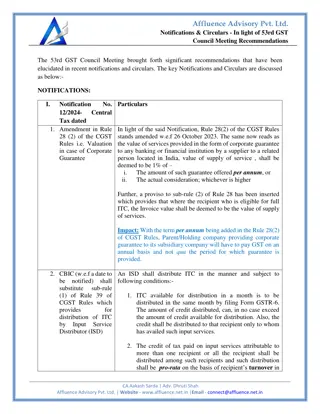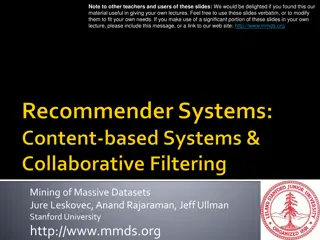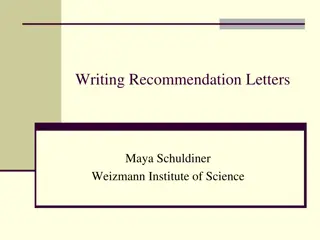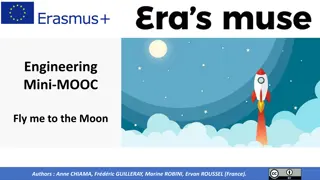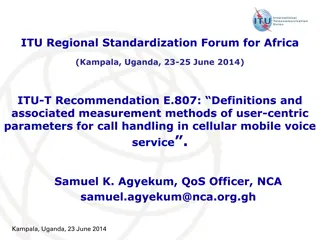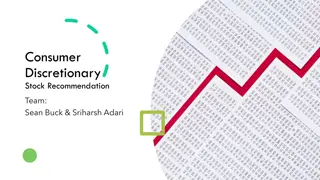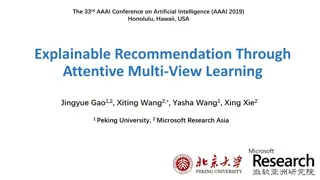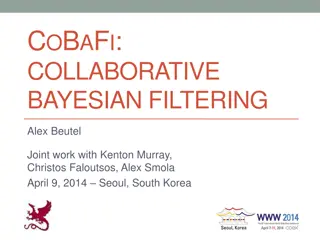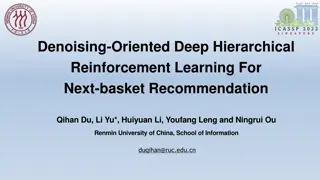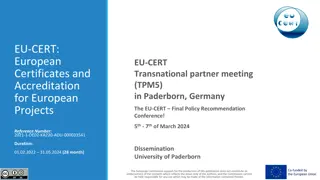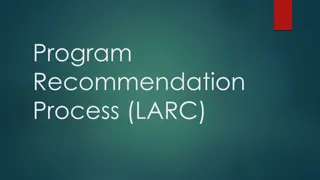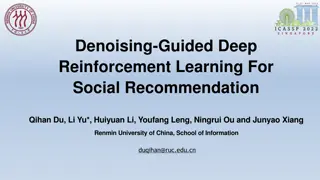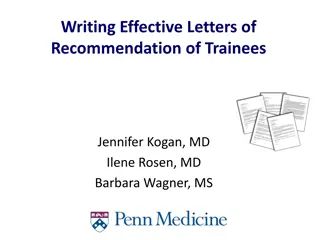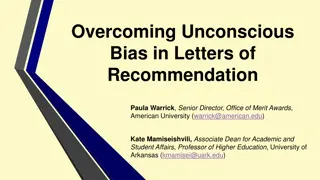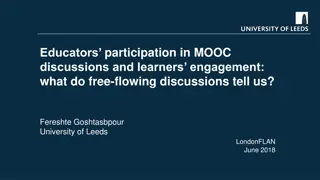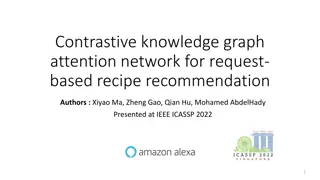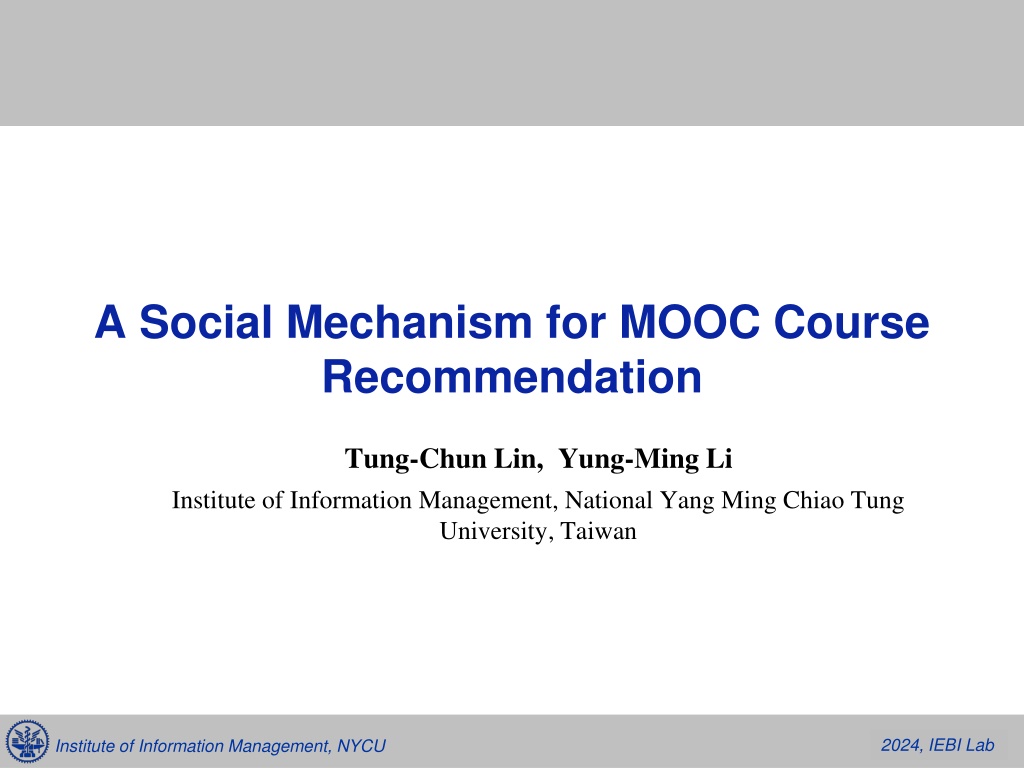
Social Mechanism for MOOC Course Recommendation Study
Explore how MOOC platforms can enhance course recommendations by analyzing users' backgrounds, interests, and social influences. Learn about the research problems, system process, and framework developed by the Institute of Information Management at NYCU.
Download Presentation

Please find below an Image/Link to download the presentation.
The content on the website is provided AS IS for your information and personal use only. It may not be sold, licensed, or shared on other websites without obtaining consent from the author. If you encounter any issues during the download, it is possible that the publisher has removed the file from their server.
You are allowed to download the files provided on this website for personal or commercial use, subject to the condition that they are used lawfully. All files are the property of their respective owners.
The content on the website is provided AS IS for your information and personal use only. It may not be sold, licensed, or shared on other websites without obtaining consent from the author.
E N D
Presentation Transcript
A Social Mechanism for MOOC Course Recommendation Tung-Chun Lin, Yung-Ming Li Institute of Information Management, National Yang Ming Chiao Tung University, Taiwan 2024, IEBI Lab 2024, IEBI Lab Institute of Information Management, NYCU
Background The transformation of knowledge acquisition. MOOC s excellent functions, flexibility, and ultimate accessibility can meet the needs of learners and spread to the world. (Azhari & Ming, 2015) Coursera s learners have increased from 45 million in 2019 to 75 million in 2020. The proportion of users has increased by 66%. (Zalani, 2021) The rapid development of MOOC 33% of learners find new jobs by completing MOOC courses. (Zhenghao, 2015) The usefulness and usability of the skills determine the learning and continuity of these skills . (Panigrahi et al., 2018) Institute of Information Management, NYCU 2024, IEBI Lab 2024, IEBI Lab 2
Motivation MOOC has a large and diverse group of learners with different backgrounds, with different intentions and motivations. (Breslow et al., 2013) About 52% of the learners is to improve their current job or find a new job 28% of learners want to gain more academic knowledge. (Zhenghao, 2015) MOOC course selection remains a challenging problem MOOC platform cannot evaluate the user s abilities, resulting in the inability to find the knowledge that they need. People often adopt decisions that follow the public to simplify the decision-making process.(Fu & Sim, 2011) Institute of Information Management, NYCU 2024,IEBI Lab 2024, IEBI Lab 3
Research Problems How to find the user's need through their learning background, past experience, and interests? How to evaluate and use the social trends that influence users to choose courses? How to recommend suitable courses according to personal interests combined with social trend? Institute of Information Management, NYCU 2024,IEBI Lab 2024, IEBI Lab 4
System Process Institute of Information Management, NYCU 2024,IEBI Lab 2024, IEBI Lab 5
System Framework Institute of Information Management, NYCU 2024,IEBI Lab 2024, IEBI Lab 6
System Framework Institute of Information Management, NYCU 2024,IEBI Lab 2024, IEBI Lab 7
Data Preparation Module Data Collections: LinkedIn and LinkedIn Learning We use the python crawler method to retrieve the information of LinkedIn users and the course materials of LinkedIn Learning. Data Cleaning Data-level: delete missing value and drop the duplicated data. Content-level: filter the non-English word and html elements. Use Tokenize in NLTK to separate the text and use NLTK stop words to remove these stop. Data Extraction Removed users whose personal data was empty. Avoid the possibility of these abnormal data from affecting the experiment and fake accounts. Institute of Information Management, NYCU 2024,IEBI Lab 2024, IEBI Lab 8
System Framework Institute of Information Management, NYCU 2024,IEBI Lab 2024, IEBI Lab 9
User Preference Analysis Module User Profile Analysis Infer the company's industry type based on the user's past work experience Identify following companies belonging to the user's preferred industry category. ????????_????????? = ??? ? ????????? ???? ??????????? ? ????????? {????????_????????} = ????????? ??????? ? ????????? ????????_????????? Institute of Information Management, NYCU 2024,IEBI Lab 2024, IEBI Lab 10
User Preference Analysis Module Skills Analysis Basic Skills: The skills we found out from user and person information. Hidden Skills: Find out the required skills of experienced jobs and interested companies according to the industry skill table provided by LinkedIn. (The World Bank, 2019) ?????????? min(??????????) max ?????????? min(??????????) ???_???? ??= (Skill from Experience) #??????,? #?????? (Skill from Interest) ????????_??????,?= Institute of Information Management, NYCU 2024,IEBI Lab 2024, IEBI Lab 11
System Framework Institute of Information Management, NYCU 2024,IEBI Lab 2024, IEBI Lab 12
Course Analysis Module Description Analysis Use unigram for TF-IDF to identify the skill ) ???(???????) = #((????? ???????) ????(??????? Calculate Jaccard Similarity between user skill (Basic skill, job skill, interest skill) and course description Basic skill course similarity ??????????_ ??????????(??,??) Job skill course similarity ????????_??????????(??,??) ?????????????_?????????? (??,??) Interest skill course similarity Fitness between the skills to teach in the course and the skill users are interested in learning ??????_??????? ????????_??????? ????_?????(??,??) = ??????_??????? ????????_??????? Institute of Information Management, NYCU 2024,IEBI Lab 2024, IEBI Lab 13
Course Analysis Module Interaction Analysis We will calculate the discussion emotion score of the course, the number of comments, and the degree of social users' preference for the course. ????????_?????(??) #????????(???????(??)) #????????(???????(??))) = ???????_???(??) #???????(??) ???(#???????(??)) ???(#???????(??)) ???(#???????(??)) = ??????????_?????(??) #????(??) #???????(??) = Institute of Information Management, NYCU 2024,IEBI Lab 2024, IEBI Lab 14
System Framework Institute of Information Management, NYCU 2024,IEBI Lab 2024, IEBI Lab 15
Social Influence Analysis Module Skill Endorsement Score In the LinkedIn platform, users can be endorsed their skills based on their past experience by their friends. S????_????????????_?????(??,??) 1 + #???????????(??,??) min(#???????????(??,??) max #???????????(??,?? min(#???????????(??,??) = Course Influence Score Calculate the Course Influence score of MOOC platform. ???????????????_?????(??) = ? ????????_?????(??) +? ???????_??????????_??? + ? ??????????_?????(??) ? ??? ? + ? + ? = 1 ??? ?,?,? 0 Institute of Information Management, NYCU 2024,IEBI Lab 2024, IEBI Lab 16
System Framework Institute of Information Management, NYCU 2024,IEBI Lab 2024, IEBI Lab 17
Course Matching Engine Module User Preference Analysis ??????????_?????(??,??) = ??????????????_?????????? (??,??) ????????_?????(??,??) +????????_??????????(??,??) ???_???? ?(??,??) +??????????_??????????(??,??) S????_????????????_?????(??,??) Course Recommendation We combine personal preferences and social preferences to generate course recommendations. ??????_?????????(??,??) = ? ??????????????? ??,??+ ? ???_????? ??,?? + ? ???????????????_?????(??) Institute of Information Management, NYCU 2024,IEBI Lab 2024, IEBI Lab 18
Data Preparation Module Data Collections Platform : LinkedIn and LinkedIn Learning. Crawl 3019 user's profile data from LinkedIn and crawl 100-course information from LinkedIn Learning. Data Cleaning Remove the missing value data and non-English data. Remove punctuation and duplicate values of the user s profile. Use Tokenize in NLTK to separate the text and use NLTK stop words to remove these stop words. Data Extraction For user data: past work experience, skill list, the company that the user follows. For course data: course description, course covered skills, number of likes, number of students, and course comments. Institute of Information Management, NYCU 2024,IEBI Lab 2024, IEBI Lab 19
Data Preparation Module Course Data No. Number of learners Number of like Number of comments Course covered skills Microsoft Excel, Spreadsheets Communication, Public Speaking Interpersonal Communication, Teamwork, Time Management Advertising, B2B Marketing, Enterprise Management Python (Programming Language), Programming Resiliency, Leadership Course #1 732242 26955 806 Course #2 879781 39529 348 Course #3 825031 37223 241 Course #4 538157 20412 706 Course #5 181214 14770 251 Course #6 254613 20119 809 Course #7 3573142 178446 112 Institute of Information Management, NYCU 2024,IEBI Lab 2024, IEBI Lab 20
User Preference Analysis Module User Profile Analysis Find out the user's job industry and interested industry category. User Job company Information Technology & Services Grit Infosys BPM Insurance Discover21799882 GoHealth Financial Services TravelingIman ICICI Prudential AMC Ltd User Interested industry Information Technology & Services/Investment Banking/ Financial Services Computer Software/Telecommunications/ Information Technology & Services Marketing & Advertising/Management Consulting/Insurance 0918Bask HottMusic BartonuqzBernie Institute of Information Management, NYCU 2024,IEBI Lab 2024, IEBI Lab 21
User Preference Analysis Module Skills Analysis Find out the skills that the industry may need. Industry The skills that the industry may need Automotive/Negotiation/Leadership/Manufacturing Operations /Digital Literacy/Teamwork/Business Management/ Customer Experience/Foreign Languages/Maintenance & Repair Retail Packaging/Manufacturing Operations/Negotiation/ Product Development/Leadership/Plastics/Business Management/ Teamwork/Digital Literacy/Foreign Languages Web Development/Digital Marketing/Social Media/Teamwork/ Leadership/Development Tools/Graphic Design/ Digital Literacy/Business Management/Marketing Automotive Packaging & Containers Internet Institute of Information Management, NYCU 2024,IEBI Lab 2024, IEBI Lab 22
Course Analysis Module Description Analysis Use the python nltk to make the unigram of each course. effective time management is an indispensable skill. lay the theoretical and practical foundations for managing your time and becoming more productive. Raw text 'effective', 'time', 'management', 'indispensable', 'skill', 'lay', 'theoretical', 'practical', 'foundations', 'managing', 'time', 'becoming', 'productive' Unigram Institute of Information Management, NYCU 2024,IEBI Lab 2024, IEBI Lab 23
Course Analysis Module Description Analysis Use Jaccard Similarity to measure the similarity of user interested skills and course covered skills. User Course1 Course2 Course3 Qqq344 0.0303 0.0152 0.0145 Frswq99 0.0235 0.0118 0.023 Tesla22 0.0 0.0204 0.0192 Mkld007 0.0208 0.0208 0.0196 Kevin 0.0241 0.0120 0.01162 Institute of Information Management, NYCU 2024,IEBI Lab 2024, IEBI Lab 24
Course Analysis Module Interaction Analysis We use Vader to calculate the emotion of the course, and calculate the popularity of the course according to the learner s preference. Example Sentence VADER value The course is very great! {'neg': 0.0, 'neu': 0.461, 'pos': 0.539, 'compound': 0.6893} I completed the course then took the exam and I believe they made a mistake on one of the questions. {'neg': 0.112, 'neu': 0.888, 'pos': 0.0, 'compound': -0.34} I really enjoyed this lecture. Thanks for the help in advance! {'neg': 0.0, 'neu': 0.527, 'pos': 0.473, 'compound': 0.5563} {'neg': 0.0, 'neu': 0.404, 'pos': 0.596, 'compound': 0.7088} Institute of Information Management, NYCU 2024,IEBI Lab 2024, IEBI Lab 25
Social Influence Analysis Module Skill Endorsement Score We use regularization to calculate the familiarity of each skill. User Examples of Skill Endorsement Score ['Microsoft Office', 0.4615], ['data management', 0.3077], ['data entry', 0.2308] FF778 ['Microsoft Excel', 0.5], ['Teamwork', 0.25], ['Team Management', 0.25] TESS356 ['Banking', 0.375], ['Customer Service', 0.3125], ['Data Entry', 0.25], ['Accounting', 0.0625] CSD114 Institute of Information Management, NYCU 2024,IEBI Lab 2024, IEBI Lab 26
Social Influence Analysis Module Course Influence Score We calculate the social score of each course based on emotional polarity, comment length, and popularity. ???????????????_?????(??) = ? ????????_?????(??) +? ???????_??????????_??? + ? ??????????_?????(??) Course Polarity_Score Comment_len Popular_Score Social Score 0.52724086 0.10008845 0.44181037 0.399095133 Course1 0.186978531 0.1000028 0.16958338 0.160885809 Course2 0.337239251 0.1000084 0.28979308 0.266069995 Course3 Institute of Information Management, NYCU 2024,IEBI Lab 2024, IEBI Lab 27
Course Matching Engine Module User Preference Analysis ??????????_?????(??,??) = ????????_?????????? (??,??) ????????_?????(??,??) +???_??????????(??,??) ???_???? ?(??,??) +?????_??????????(??,??) S????_????????????_?????(??,??) User Course1 Course2 Course3 Course4 0.25343316 0.04558028 0.14717777 0. 30223526 Grit 0.03925343 0.18273415 0.0 0.08040303 Discover21799882769 0.10564599 0.06692993 0.2280198 0.14754222 TravelingIman Institute of Information Management, NYCU 2024,IEBI Lab 2024, IEBI Lab 28
Course Matching Engine Module We use ranking tasks as our recommendation method. The system goal is recommending the most relevant courses to users, called top-N recommendation. Our top-N accuracy metrics is the Recall@N and Precision@N. (Cremonesi et al. 2016) ?????????@? =# ??? ? |?|=??????(?) # ??? |?| ??????@? = ? | T | is the number of courses #hits indicates the number of hits in the top N lists. User Course1 Course2 Course3 Course4 0.652528293 0.444675413 0.546272903 0.701330393 Grit 0.200139239 0.343619959 0.160885809 0.241288839 Discover21799882769 0.371715985 0.332999925 0.494089795 0.413612215 TravelingIman Institute of Information Management, NYCU 2024,IEBI Lab 2024, IEBI Lab 29
Comparison with Other Benchmark Methods Evaluation of our engine and other benchmark performance Method R @ 5 R @ 10 P @ 5 P @ 10 0.24459 0.43902 0.048918 0.043902 Content-Based 0.32738 0.63621 0.065476 0.063621 Collaborative-Based 0.49651 0.67542 0.099302 0.067542 SCR Institute of Information Management, NYCU 2024,IEBI Lab 2024, IEBI Lab 30
Thank You for Your Attention! Institute of Information Management, NYCU 2024,IEBI Lab 2024, IEBI Lab 31





